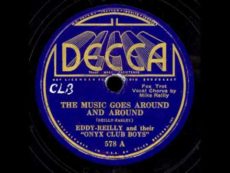
Daily Dose Of Jazz…
Eddie Farley was born on July 16, 1904 in Newark, New Jersey. He received his trumpet education at Sacred Heart and St. Benedict Prep School in Newark. After graduating he played in dance orchestras led by Bert Lown and his Hotel Biltmore Orchestra, an outfit he began playing with in the late ’20s for several years and with drummer Will Osborne in the early Thirties. By 1935 he organized his own orchestra with Mike Riley for his NBC radio program and his career was doing quite well around New York City in addition to touring the country.
He is best known for the mid ’30s hit The Music Goes ‘Round and Round”, and was the high point in the songwriting and bandleading partnership of Farley and Mike Riley. However the thrill of working together only lasted until 1936 and after firing their own respective combo cannonballs Eddie had success with it, adding his own pleasant vocals to the mix and holding down stints at ritzy venues such as the Midnight Club and Meadowbrooks.
Joining ASCAP in 1941, his chief musical collaborator was Mike Riley, and his other popular-song compositions include I’m Gonna Clap My Hands, There’s Something In the Wind and Looking for Love. The ’50s saw his group featured at the Ivanhoe Club in Irvington, New Jersey, Farley making his home within a short drive from the gig in Essex, New Jersey where the trumpeter, composer, vocalist, conductor, author and songwriter passed away in 1983.
![]()
More Posts: trumpet
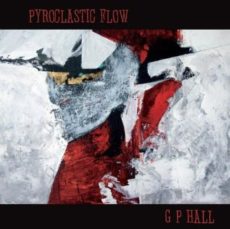
Daily Dose Of Jazz…
Graham Peter Hall, generally known as GP Hall, was born on July 15, 1943, and raised in Hampton Hill, London, United Kingdom, where he was schooled in classical, flamenco and jazz. As a teenager he went on to play in the Odd Lot Band and set up the Odd Lot Club as a venue for their music, which in turn attracted more established bands and players for concerts.
As he became better known, Hall went on to play at more celebrated London venues including The Roundhouse, the Middle Earth club and a residency at the 100 Club. He would back Deep Purple, The Hollies, Chris Farlowe and played with John Lee Hooker, Sonny Boy Williamson and with Casey Jones & The Governors.
His musical approach broadened in the early 1970s where he spent time studying with Romani musicians and flamenco guitarist Manitas de Plata, became involved in more avant-garde work, writing, producing and performing, and became the musical director for the multi-media performance art group Welfare State International.
By 1972 GP composed and recorded The Estates on Prototype Records, followed three years later by his sophomore project Manifestations. But around this time, his promising career fell into a fifteen-year depression due to personal trauma. It was until the Eighties that he re-emerged into the music world with his twenty-nine track Colors (Movements) a series of instrumental albums on the Kenwest label. The 90s saw the release of a solo album Imaginary Seasons on his own Imaginary Music label that was nominated for the Mercury Music Prize, followed by Figments Of Imagination in 1996 and an appearance on the Unknown Public compilation alongside guitarists Bill Frisell, Frank Zappa, John Zorn and Robert Fripp.
Into the new millennium the guitarist has continued to record new and old music combining them with live performances, created eclectic instrumental and industrial inclined works, recorded several unreleased albums and collaborated with percussionist Justin Ash, painter Alistair Michie, Lol Coxhill, Paul Rutherford, Jeff Clyne, John Ellis and Lyn Dobson, among others.
Hall invented the musical genre known as Industrial Sound Sculptures, draws on classical, rock, jazz, flamenco, folk and blues styles and performs mainly in the free jazz and avant-garde genres, though much more melodic. He uses a variety of techniques such as slides, fingerpicking and found implements like crocodile clips, palette knives, velcro strips, an antique psaltery bow and wind-up toy to create a variety of different sounds.
Guitarist GP Hall is adept with electric and electronic playing but is also known for his particular virtuosity as an acoustic guitarist, an expert flamenco guitarist, and an accomplished classical-style player. He also plays a customized Shergold six-string bass guitar featuring a half-fretted, half-fretless fretboard and has been known to dabble in playing other instruments such as double bass, piano, soprano saxophone and varied percussion, and vocals as he continues his musical journey.
![]()
More Posts: guitar
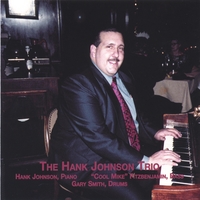
Daily Dose Of Jazz…
Hank Johnson was born Stuart H. Tresser in the Bushwick section of Brooklyn, New York on July 14, 1949. He began playing the piano at three years old with his first piano teacher Mrs. Henryetta Klein. He continued his private lessons with classical teacher Ms. Malady at the Brooklyn Conservatory of Music, Morty Reed, Teddy Wilson and Horace Parlan. Studying with Machito’s copyist and arranger Ray Cox, he learned to write music.
Graduating from George W. Wingate High School in Brooklyn in 1967, Hank won 1st prize at the high school talent show with the first interracial jazz trio and vocalist. Not satisfied with just becoming a great pianist he went on to matriculate through New York City Technical College with a degree in graphic arts and advertising technology, and New York Institute of Technology in Communication Arts.
In 1977 Hank had replaced Jimmy Nottingham’s trio at the Village Door Restaurant and Supper Club in Jamaica, Queens, NY. It was there at the Village Door that Hank got the hands on experience that would spark and ignite his goal to share his talent with the world.
He founded the independent record label Jazzbone Records where he composes and produces. Presently he continues to perform around his native New York, is the director of Tresser Printing Office, a security printer and a division of Tresser Music, music publishers.
![]()
More Posts: piano
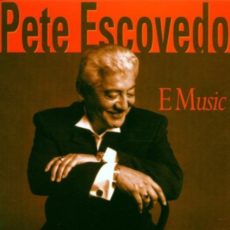
Daily Dose Of Jazz…
Peter Michael Escovedo was born on July 13, 1935 in Pittsburg, California of Mexican heritage. With his two brothers, he formed the Escovedo Brothers Latin Jazz Sextet, before Santana hired him and his brother Coke to play in his band.
Long well known on the San Francisco Bay Area music scene for several decades, in 2002 Pete made a notable national television appearance on the “By the Hand of the Father” episode of the PBS Austin City Limits program. He would go on to lead the 14-24 piece Latin big band Azteca.
Escovedo, along with his sons Juan and Peter Michael recorded with Latin Rock group El Chicano and their 3 piece percussion is featured on the studio album.
Percussionist Pete Escovedo has recorded eleven albums as a leader for Concords Jazz, Crossover and Picante labels, Fantasy and EsGo/Fantasy. He continues to tour, perform and record Latin Jazz at 80 years old.
Sponsored By
![]()
More Posts: percussion
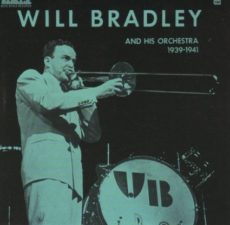
Daily Dose Of Jazz…
Will Bradley was born Wilbur Schwichtenberg on July 12, 1912 in Newton, New Jersey. He became one of the premier trombonists on the New York swing scene, and he often participated in jam sessions broadcast on The CBS Saturday Night Swing Club. In 1939 he and drummer Ray McKinley formed a big band with pianist Freddie Slack that became well known for boogie-woogie, with hit records Beat Me Daddy, Eight to the Bar and Scrub Me Mama with a Boogie Beat and Down the Road a Piece. The latter song was recorded with Bradley, Ray McKinley, Doc Goldberg, Freddie Slack, with guest vocals by songwriter Don Raye.
He was one of the first band-leaders in the 1940s to appear in Soundies, three-minute musical films made for coin-operated movie jukeboxes. Their wide distribution gave the band valuable exposure with drummer Ray McKinley doing most of the vocals. After McKinley left to form his own band, Bradley joined the United States Air Force, where he played in the Glenn Miller Air Force Band and he disbanded his group due to the problems of wartime. He would go on to record with Ruth Brown and Charlie Parker and he became a studio musician, playing for many years in the The Tonight Show Band during the Johnny Carson era.
He was the band-leader for the Summer Silver Theater on CBS radio in 1941, with Ed Sullivan as the show’s host. Trombonist and bandleader Will Bradley, known for swing, sweet dance music and boogie-woogie songs, passed away on July 15, 1989, three days after his 77th birthday.
More Posts: trombone



